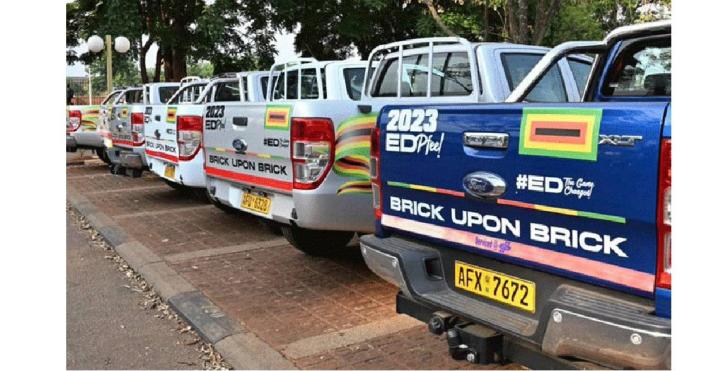News / National
Zanu-PF tells members that donated vehicles must be registered
07 Jul 2025 at 07:48hrs |
0 Views

Tensions are rising within Zanu-PF after the party's top leadership issued a directive requiring all assets-including motor vehicles-donated in the party's name to individuals or organisations to be handed over for regularisation by the end of July.
In a memo dated July 3, Zanu-PF secretary-general Obert Mpofu invoked party constitutional provisions to launch the exercise aimed at tightening control over donated vehicles. The memo states that vehicles given by well-wishers to party members, organs, or affiliates without formal validation from the secretary-general, treasurer-general, or national secretary for transport and social welfare must now be surrendered to the national secretary for transport and social welfare by July 31 for proper registration and management.
"This regularisation exercise includes motor vehicles donated by well-wishers to individual party members, party organs and structures without validation," Mpofu said.
The directive has sparked mixed reactions among party members. Some interviewed in a quick survey applauded the move as a necessary step to curb abuse of party resources, while others expressed suspicion that the leadership harbors a hidden agenda that may soon come to light.
Zanu-PF director for communications, Farai Marapira, clarified that the directive targets only vehicles donated for the advancement of party work, distinguishing them from gifts given to individuals personally. "This applies to party members who were given motor vehicles to help them to work for the betterment of the party; it is different from someone receiving the donation as an individual," Marapira said.
Meanwhile, a youth leader in Mashonaland West defended the move, saying the directive was crucial to rein in rampant abuse of party assets. "The secretary-general must be in control of all party assets, including those in the hands of party affiliates," he said.
However, some Zanu-PF insiders are questioning the timing and intent behind invoking these constitutional sections, pointing out the glaring silence during the recent campaign period when senior party leaders reportedly received lavish gifts without scrutiny.
A senior party member who spoke on condition of anonymity suggested the vehicle regularisation drive is linked to ongoing factional battles within the party. He said it aims to dismantle parallel power structures and affiliates operating outside formal party oversight.
"This is designed to remove parallel structures being created outside party structures. There are so many affiliates that are not accountable to the party and that is a recipe for disaster since they have resources that are not controlled by the party," he explained.
The issue of Zanu-PF members misusing party vehicles is not new. In 2023, party national chairperson Oppah Muchinguri-Kashiri publicly acknowledged reports of members abusing their vehicles and refusing to pay toll fees nationwide. She revealed that some members flashed party cards to intimidate Zimbabwe National Road Administration (ZINARA) officials and evade toll payments.
As the July 31 deadline approaches, eyes remain on how many vehicles will be surrendered and whether the regularisation exercise will bring much-needed discipline-or further deepen factional tensions within Zimbabwe's ruling party.
In a memo dated July 3, Zanu-PF secretary-general Obert Mpofu invoked party constitutional provisions to launch the exercise aimed at tightening control over donated vehicles. The memo states that vehicles given by well-wishers to party members, organs, or affiliates without formal validation from the secretary-general, treasurer-general, or national secretary for transport and social welfare must now be surrendered to the national secretary for transport and social welfare by July 31 for proper registration and management.
"This regularisation exercise includes motor vehicles donated by well-wishers to individual party members, party organs and structures without validation," Mpofu said.
The directive has sparked mixed reactions among party members. Some interviewed in a quick survey applauded the move as a necessary step to curb abuse of party resources, while others expressed suspicion that the leadership harbors a hidden agenda that may soon come to light.
Zanu-PF director for communications, Farai Marapira, clarified that the directive targets only vehicles donated for the advancement of party work, distinguishing them from gifts given to individuals personally. "This applies to party members who were given motor vehicles to help them to work for the betterment of the party; it is different from someone receiving the donation as an individual," Marapira said.
However, some Zanu-PF insiders are questioning the timing and intent behind invoking these constitutional sections, pointing out the glaring silence during the recent campaign period when senior party leaders reportedly received lavish gifts without scrutiny.
A senior party member who spoke on condition of anonymity suggested the vehicle regularisation drive is linked to ongoing factional battles within the party. He said it aims to dismantle parallel power structures and affiliates operating outside formal party oversight.
"This is designed to remove parallel structures being created outside party structures. There are so many affiliates that are not accountable to the party and that is a recipe for disaster since they have resources that are not controlled by the party," he explained.
The issue of Zanu-PF members misusing party vehicles is not new. In 2023, party national chairperson Oppah Muchinguri-Kashiri publicly acknowledged reports of members abusing their vehicles and refusing to pay toll fees nationwide. She revealed that some members flashed party cards to intimidate Zimbabwe National Road Administration (ZINARA) officials and evade toll payments.
As the July 31 deadline approaches, eyes remain on how many vehicles will be surrendered and whether the regularisation exercise will bring much-needed discipline-or further deepen factional tensions within Zimbabwe's ruling party.
Source - NewsDay
Join the discussion
Loading comments…









































